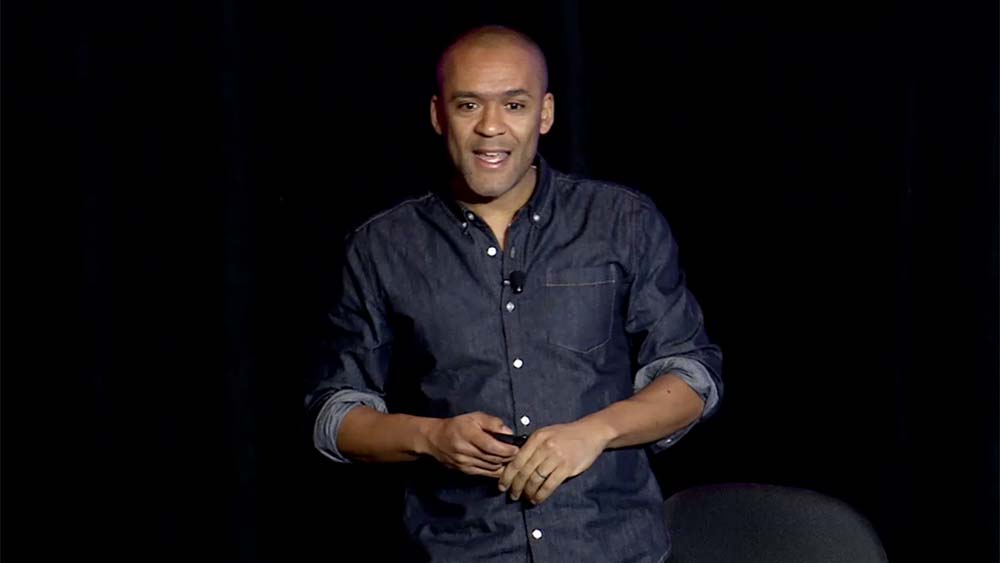
“When purpose is at the core of the obsession, it has the potential to change the world,” said Alain Sylvain, founder and CEO of strategy and design consultancy Sylvain, at Convening Leaders 2022. (Jacob Slaton Photography)
We’ve all seen or heard the purpose-driven taglines that have a “greater good” message — something that goes beyond the actual products and services of today’s most successful brands. For example, Airbnb aims to “create a world where anyone can belong,” while Tesla wants to “accelerate the world’s transition to sustainable energy.” According to Alain Sylvain, founder and CEO of strategy and design consultancy Sylvain, the world has become a bit “drunk on purpose. There are all sorts of conferences and talks about purpose, there are all sorts of books and podcasts,” he said. “Purpose is candy.” In other words, sweet to consume, but just empty calories.
Sylvain, who presented the Convening Leaders 2022 session “Post-Purpose: Go Beyond Statements to Discover the Power of Obsession,” has become “bored” with the concept of these purpose statements because they can often feel hollow, he said. “So many companies are beating their chest and so many companies believe they deserve so much attention and respect because they have a purpose. And sometimes, I question, How real is that stuff? … The truth is that a lot of these companies haven’t really aligned their businesses with the causes that they talk about.”
The public cares about supporting organizations that take corporate social responsibility seriously. In 2020, Forbes reported that 94 percent of consumers believe companies they engage with should have a strong purpose, and 83 percent of consumers said companies should only earn a profit if they also deliver a positive impact. “But the statements alone, the purpose alone, is not enough,” Sylvain argued. “There needs to be an obsession with that purpose. You need to truly imbue every ounce of that obsession into everything you do.”
Sylvain said that while the concept of obsession often has negative connotations, it can also be “pretty great.” Quoting Psychology Today, he shared, “Obsession, when made to serve us, can bring out our most capable selves, motivating us to find the creativity and ingenuity to solve incredibly difficult problems. Obsession, in short, can lead us to greatness.”
Watch the Session
Convening Leaders 2022 attendees, don’t miss your chance to peek behind-the-scenes in our MashUp Studios, or re-watch the Main Stage and other sessions in JUNO’s CL22 Library. On-demand access to CL22 content is available through March 12, 2022.
Sylvain provided two examples of this: Famed basketball player Michael Jordan, who didn’t make his high-school basketball team but was an obsessive competitor focused on winning, and anthropologist Jane Goodall, whose complete absorption into the world of chimpanzees helped her do groundbreaking scientific research. “When purpose is at the core of the obsession,” Sylvain said, “it has the potential to change the world.”
One example of a company whose laser focus on purpose is key to its success, Sylvain said, is Patagonia. He described the outdoor clothing company as “the child poster for purpose” and that people are “obsessed with Patagonia” due to the brand’s bold marketing campaigns and walk-the-talk activism that so many other organizations fail to bake into their enterprise. It’s working for them — Patagonia only has a 4-percent employee turnover and made $1 billion in annual revenue in 2020. “Purpose isn’t about being heroic or a fancy statement,” Sylvain said. “Purpose is about being obsessed about that purpose. “
Sylvain left the audience with five ways to “systematize obsession” within their own organizations. Here they are, in his own words:
- Definition — What is the purpose? Go through the work of identifying the purpose. Yes, that involves writing a statement, but it also involves getting to understand your organization’s authentic commitment to a particular idea or reason to exist.
- Alignment — Can you align every bit of your organization to that purpose — every bit? Marketing, supply chain, organization, everything, operations — so that everyone’s looking in the same direction for that same commitment to that purpose.
- Commitment — A commitment goes such a long way in galvanizing a collective obsession and a collective interest.
- Recommitment — And then after you commit, you recommit, you do it again, because there is no end to an ideal when you have a purpose in mind.
- Measurement — Hold yourself accountable so you can look back [to see] how did you perform against that purpose?
Casey Gale is associate editor at Convene.
